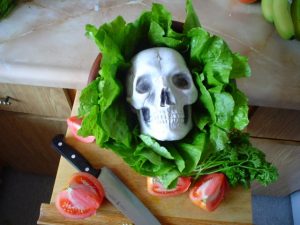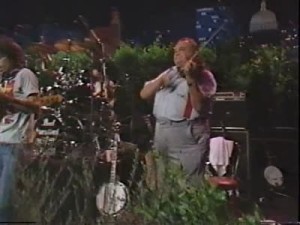 A member of the Facebook group Brisbane Snake Catchers confirmed, “Many people would think this would be an unlikely event, but it is a fairly common occurrence, just not witnessed by the public often.”
A member of the Facebook group Brisbane Snake Catchers confirmed, “Many people would think this would be an unlikely event, but it is a fairly common occurrence, just not witnessed by the public often.”
Sorta like food safety.

 A member of the Facebook group Brisbane Snake Catchers confirmed, “Many people would think this would be an unlikely event, but it is a fairly common occurrence, just not witnessed by the public often.”
A member of the Facebook group Brisbane Snake Catchers confirmed, “Many people would think this would be an unlikely event, but it is a fairly common occurrence, just not witnessed by the public often.”
Sorta like food safety.
Welcome to Washington, D.C., Frank, and government PR.
 On Nov. 20, the U.S. Food and Drug Administration and the Centers for Disease Control and Prevention warned the American public of a multi-state outbreak of E. coli O157:H7 linked to romaine lettuce and advised against eating any romaine lettuce on the market at that time.
On Nov. 20, the U.S. Food and Drug Administration and the Centers for Disease Control and Prevention warned the American public of a multi-state outbreak of E. coli O157:H7 linked to romaine lettuce and advised against eating any romaine lettuce on the market at that time.
According to FDA Commissioner Scott Gottlieb, M.D. and FDA Deputy Commissioner Frank Yiannas, we have new results to report from this investigation tracing the source of the contamination to at least one specific farm. Based on these and other new findings, we’re updating our recommendations for the romaine lettuce industry and consumers.
Today, we’re announcing that we’ve identified a positive sample result for the outbreak strain in the sediment of a local irrigation reservoir used by a single farm owned and operated by Adam Bros. Farms in Santa Barbara County.
The FDA will be sending investigators back to this farm for further sampling. It’s important to note that although this is an important piece of information, the finding on this farm doesn’t explain all illnesses and our traceback investigation will continue as we narrow down what commonalities this farm may have with other farms that are part of our investigation. While the analysis of the strain found in the people who got ill and the sediment in one of this farm’s water sources is a genetic match, our traceback work suggests that additional romaine lettuce shipped from other farms could also likely be implicated in the outbreak. Therefore, the water from the reservoir on this single farm doesn’t fully explain what the common source of the contamination. We are continuing to investigate what commonalities there could be from multiple farms in the region that could explain this finding in the water, and potentially the ultimate source of the outbreak.
 As of Dec. 13, our investigation yielded records from five restaurants in four different states that have identified 11 different distributors, nine different growers, and eight different farms as potential sources of contaminated romaine lettuce. Currently, no single establishment is in common across the investigated supply chains. This indicates that although we have identified a positive sample from one farm to date, the outbreak may not be explained by a single farm, grower, harvester, or distributor.
As of Dec. 13, our investigation yielded records from five restaurants in four different states that have identified 11 different distributors, nine different growers, and eight different farms as potential sources of contaminated romaine lettuce. Currently, no single establishment is in common across the investigated supply chains. This indicates that although we have identified a positive sample from one farm to date, the outbreak may not be explained by a single farm, grower, harvester, or distributor.
At the same time, the U.S. Centers for Disease Control updated its warning to advise U.S. consumers to not eat and retailers and restaurants not serve or sell any romaine lettuce harvested from certain counties in the Central Coastal growing regions of northern and central California. If you do not know where the romaine is from, do not eat it.
Isle of Wight, known to most Western kids as the home of a groovy rock and jazz festival, is now home to three people have a potentially fatal kidney condition following an outbreak of E. coli which has been linked to unpasteurised milk from a farm.
 Three Isle of Wight patients are being treated in hospital for hemolytic uremic syndrome, a complication of E. coli that can lead to kidney failure.
Three Isle of Wight patients are being treated in hospital for hemolytic uremic syndrome, a complication of E. coli that can lead to kidney failure.
Another four people affected by the bacteria have made a good recovery, Public Health England said.
The source has been traced to Briddlesford Lodge Farm near Newport.
Dr Ishani Kar-Purkayastha from Public Health England said the raw milk had been removed from sale.
“We are asking anyone who has raw milk purchased from Briddlesford Farm on, or before Monday, 25 September 2017, to either return it to the farm or dispose of it,” he said.
In a statement, the farm said: “We are especially concerned about the well-being of those affected by this bug, and we wish them and their families every good fortune at this terrible time.”
The outbreak has been identified as the E. coli 0157 strain, which caused the death of a three-year-old child in Scotland in 2016.
Hated the song, Miss You, when it came out on Some Girls, the go-to Stones album of my high-school yout in 1978, but saw them live in Buffalo in 1981 and they rocked it up and I sorta got it.
 Respcectable is much better from Some Girls.
Respcectable is much better from Some Girls.
Journey still sucks.
barfblog.com will be back, but a little different.
No longer tied to any sponsorship, academic or anyone.
(Chapman is, but he needs his job; I don’t).
I’m Canadian. Get used to the fucking swearing or get the fuck off.
A few years ago at the International Association for Food Protection annual meeting, I told the audience, after revealing my wife’s breast size because she asked me to shop for bras – which I did — that the audience of food safety geeks now knew more about my wife’s breast size than they knew about the food they were about to eat for dinner, where it came from, and how it was prepared.
A government-type said she couldn’t read me anymore.
Then don’t.
Or the way 1.5 million attended my farewell blog.
But a few thousand have written in so:
After 25 years of food safety risk communication, nothing has changed.
A self-congratulating-largely-taxpayer-funded crowd to tell people food safety is their fault is not a movement.
Cut-and-paste press releases do not make a publication, regardless of medium – and I’ll take on anyone who wants to talk the medium is the message by University of Toronto prof Marshall McLuhan.
I miss you probably not in the same way Jamie Oliver misses his parents, who own The Cricketers Pub in Essex, England, and was downgraded from the highest rating of 5 to 2 for poor hygiene after inspectors found dead uncooked pheasants next to pre-cooked potato chips, frozen chicken that expired three months ago, and dirt and grease through tout the kitchen.
Then there’s the academics, going on about food safety culture, about eight-years after it jumped the shark.
I’ll let the abstract speak for itself:
In an intensifying climate of scrutiny over food safety, the food industry is turning to “food safety culture” as a one-size-fits-all solution to protect both consumers and companies. This strategy focuses on changing employee behavior from farm to fork to fit a universal model of bureaucratic control; the goal is system-wide cultural transformation in the name of combatting foodborne illness. Through grounded fieldwork centered on the case of a regional wholesale produce market in California, we examine the consequences of this bureaucratization of food safety power on the everyday routines and lived experiences of people working to grow, pack, and deliver fresh produce. We find that despite rhetoric promising a rational and universal answer to food safety, fear and frustration over pervasive uncertainty and legal threats can produce cynicism, distrust, and fragmentation among agrifood actors. Furthermore, under the cover of its public health mission to prevent foodborne illness, food safety culture exerts a new moral economy that sorts companies and employees into categories of ‘good’ and ‘bad’ according to an abstracted calculation of ‘riskiness’ along a scale from safe to dangerous. We raise the concern that ‘safety’ is usurping other deeply held values and excluding cultural forms and experiential knowledges associated with long-standing food-ways. The long-term danger, we conclude, is that this uniform and myopic response to real risks of foodborne illness will not lead to a holistically healthy or sustainable agrifood system, but rather perpetuate a spiralling cycle of crisis and reform that carries a very real human toll.
Oh Fonz.
I’ve been to my share of open-air music festivals or, as we called them, concerts, outside: The Who, Toronto, 1980; Rolling Stones, Buffalo, 1981; Grateful Dead, Toronto, 1987; Tragically Hip, Toronto, a few times; Jimmy Buffet, Toronto, a few times; Blue Rodeo, Guelph, 2000; Lyle Lovett, 2002,  Toronto, John Prine, Toronto, a few times, Jerry Reid, Barrie, 1986, Neil Young, Toronto, many times, and Neil Young, Brisbane, 2013, oops not, stuck in an airport, and many more I can’t remember.
Toronto, John Prine, Toronto, a few times, Jerry Reid, Barrie, 1986, Neil Young, Toronto, many times, and Neil Young, Brisbane, 2013, oops not, stuck in an airport, and many more I can’t remember.
Sometimes we got wet.
Researchers in Marseille, writing in Eurosurveillance, state that in the minds of many, large scale open air festivals have become associated with spring and summer, attracting many people, and in the case of music festivals, thousands of music fans. These festivals share the usual health risks
associated with large mass gatherings, including transmission of communicable diseases and risk of outbreaks. Large scale open air festivals have however specific characteristics, including outdoor settings, on-site housing and food supply and the generally young age of the participants. Outbreaks at large scale open air festivals have been caused by  Cryptosporium parvum, Campylobacter spp., Escherichia coli, Salmonella enterica, Shigella sonnei, Staphylococcus aureus, hepatitis A virus, influenza virus, measles virus, mumps virus and norovirus. Faecal-oral and respiratory transmissions of pathogens result from non-compliance with hygiene rules, inadequate sanitation and insufficient vaccination coverage. Sexual transmission of infectious diseases may also occur and is likely to be underestimated and underreported. Enhanced surveillance during and after festivals is essential. Preventive measures such as immunisations of participants and advice on-site and via social networks should be considered to reduce outbreaks at these large scale open air festivals.
Cryptosporium parvum, Campylobacter spp., Escherichia coli, Salmonella enterica, Shigella sonnei, Staphylococcus aureus, hepatitis A virus, influenza virus, measles virus, mumps virus and norovirus. Faecal-oral and respiratory transmissions of pathogens result from non-compliance with hygiene rules, inadequate sanitation and insufficient vaccination coverage. Sexual transmission of infectious diseases may also occur and is likely to be underestimated and underreported. Enhanced surveillance during and after festivals is essential. Preventive measures such as immunisations of participants and advice on-site and via social networks should be considered to reduce outbreaks at these large scale open air festivals.
Holidays are all about tradition. After five years in Kansas, Amy and Sorenne and I have settled into a routine of lamb (that was last night), fish, cognac and champagne and no barfing, except 2006, when Amy was so sick we got married.
There’s the television shows: It’s a Wonderful Life, White Christmas, Scrooged, endless children’s specials. TBS runs a 24-hour marathon of nothing but the quirky 1983 holiday entry, A Christmas  Story. But for us, nothing captures the true meaning of Christmas better than the 2004 Trailer Park Boys Christmas Special.
Story. But for us, nothing captures the true meaning of Christmas better than the 2004 Trailer Park Boys Christmas Special.
In this scene (language warning), Ricky extols to the congregation in Dartmouth, Nova Scotia (that’s in Canada), about the true meaning of Christmas.
“Sorry to interrupt, but I just had one of those brain-learning things pop into my head. … What is Christmas? I just got out of jail, which was awesome, you know, they don’t have presents and lights and tress, we just get stoned and drunk, it’s the best time. And I get out here and I’m all stressed out.
“… That’s not what Christmas should be, you should be getting drunk and stoned with your friends and family, people that you love. … That’s Christmas. … Getting drunk and stoned with your families and the people that you love. And if you don’t smoke or drink, just spend time with your families. It’s awesome. Merry Christmas.”
Or as Sorenne says, don’t make your friends and family barf with bad food safety.